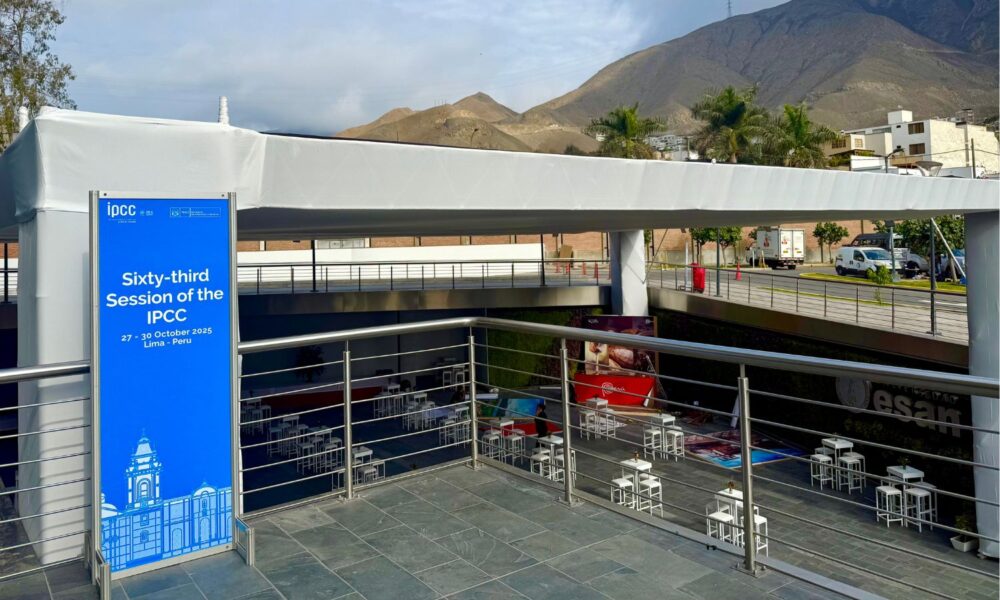Last week in Lima, Peru, governments convened for the sixty-third session of the Intergovernmental Panel on Climate Change (IPCC). This was a plenary meeting, where government representatives debate and decide on things like future meetings, budgets, and approve outlines for reports. It is different from an expert meeting, where scientists come together to assess research, review evidence, and draft the reports that form the scientific foundation of the IPCC’s work. The distinction matters because in a plenary it’s the political dynamics that often shape outcomes and that was evident throughout the week.
The IPCC has long played a critical role in bringing science together to inform policy and guide climate action worldwide. This plenary did move some pieces forward, but other decisions were delayed yet again. The science itself is not in question. We have a strong and clear body of evidence that already points the way. What worries me is watching governments, after two years of negotiations, struggle to resolve procedural questions, like agreeing on a timeline for when these reports will be completed. While some countries raised genuine concerns about inclusivity and capacity, others appeared to engage in delay for its own sake, advancing arguments that seemed designed more to stall than to strengthen the process. Seeing this level of gridlock raises concerns about what lies ahead, especially as we approach COP30 in Belém, where the stakes for global cooperation will be far higher.
Why the IPCC matters for climate policy
Since its creation in 1988, the IPCC has played a central role in connecting science and policy. It was established by the United Nations and the World Meteorological Organization to assess the state of climate knowledge and make that information usable for decision-makers. The IPCC’s mandate is to be policy-relevant but not policy-prescriptive. Its role is to inform, not to decide. That distinction is essential to its legitimacy. The strength of the IPCC lies in its ability to synthesize evidence across disciplines and present it in a way that governments can use to craft effective and equitable policies. Every major climate agreement, from the 1992 UN Framework Convention on Climate Change to the 2015 Paris Agreement, has been informed by IPCC findings.
In 1990, its First Assessment Report established that human influence on the climate was detectable. In 2001, the Third Assessment Report stated that warming of the climate system is unequivocal. By 2013, the Fifth Assessment Report quantified with more than 95 percent confidence that human activity is the dominant cause of observed warming since the mid-twentieth century. The last IPCC assessment left no room for doubt. Human influence has unequivocally warmed the atmosphere, ocean, and land, causing widespread and intensifying impacts, some already irreversible on human timescales. Every fraction of a degree of additional warming will make these consequences worse.
While the IPCC does not make policy recommendations, its assessments give governments a shared set of facts on which to base negotiations, regulations, and national commitments. In that sense, the IPCC has been one of the most influential scientific collaborations in history.
IPCC advances on carbon removal and coordination, but timeline disputes persist
As noted in my last blog, there are three things I followed closely during this meeting: the proposed outline for the Carbon Dioxide Removal (CDR) Methodology Report, the progress updates from the IPCC’s three Working Groups, and the decision on the overall timeline for the Seventh Assessment Cycle (AR7). Here’s a quick report on what happened:
- Governments approved the outline and work plan for the 2027 Methodology Report on Carbon Dioxide Removal Technologies, Carbon Capture, Utilization, and Storage (CCUS), confirming that work can now begin. The decision also included a compromise to hold a joint expert meeting in 2026 to further examine ocean-based carbon dioxide removal methods such as ocean alkalinity enhancement and direct ocean capture, which were not included in the current report scope.
- The three IPCC Working Groups, which are the heart of its scientific review process, reported that author teams have now been selected and are moving forward with their work. Despite the absence of an agreed long-term schedule, the scientific process continues, with authors coordinating across regions to ensure the next assessment reflects the best available evidence.
- Governments were again unable to reach consensus on an overall timeline for the assessment cycle. Some countries called for a longer process to reduce strain on smaller governments and allow fuller participation of scientists from the Global South, while others stressed the importance of completing the reports in time to inform the 2028 Global Stocktake (GST). The credibility of the IPCC depends on inclusivity and rigor, but its relevance depends on timeliness, and finding a balance between the two remains an ongoing challenge.
A test of global cooperation
For two years, governments have been unable to agree even on the schedule for the Working Group reports in the 7th assessment cycle, a procedural step that is normally routine and uncontroversial. Watching this unfold has been difficult, not because of the technical complexity of the issue, but that over the course of two years, governments have failed to understand each other and come to a compromise decision.
The question now is this: what will it take for governments to make decisions efficiently, transparently, and collaboratively? If agreement on the process for simply putting out a synthesized climate report is this hard, how will the world find common ground on actions, implementation, and accountability? The IPCC process was designed to bring science and diplomacy together in a shared pursuit of understanding. When that collaboration falters, I’m nervous that it may be symptomatic of a deeper challenge for global governance.
Looking ahead to COP30
While I was disappointed that governments could not agree on a timeline, I left Peru with an important realization: regardless of when this assessment cycle is completed, the science we need to act right now is already clear (and it has been for years). The IPCC concluded as early as 2001 that warming of the climate system is unequivocal and that human activity is a key contributor. Two decades later, that conclusion has only grown stronger. And it is not just the IPCC that has reached this finding. The 2025 Emissions Gap Report from the UN Environment Programme reinforces the same message, warning that even with new pledges under the Paris Agreement, the world remains far off track. Global temperatures are still projected to rise between 2.5°C and 2.9°C this century, with every fraction of a degree avoided means fewer losses and lower costs. The trend across the scientific community is unmistakable. The evidence is overwhelming, the impacts are escalating, and the need for rapid and transformative action is clear.
Global cooperation is not optional—because climate change transcends borders, and no nation alone can solve a crisis that affects every region, economy, and community. Acting in good faith within these international processes is the only way to build the trust and shared responsibility needed for meaningful progress.
In many ways, the challenge of our time is about acting on what we know. As the world heads into COP30, governments have a chance to demonstrate that multilateral processes can still deliver progress. The IPCC will continue its work, and scientists will continue to provide needed evidence. What we need now is for policymakers to act in collaboration and with the discipline and urgency that the science has long demanded.

